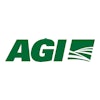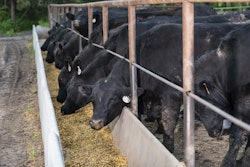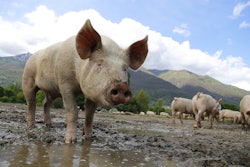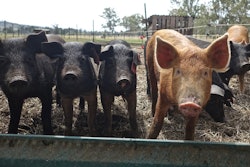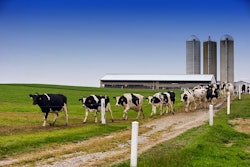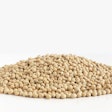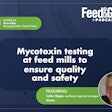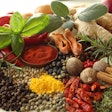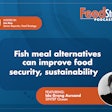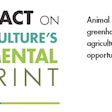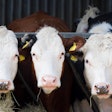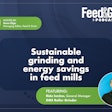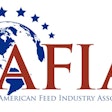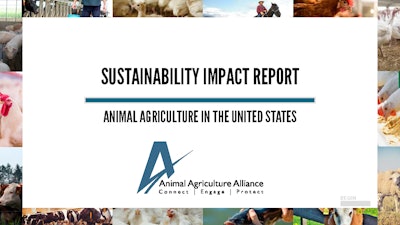
Today, the Animal Agriculture Alliance released its “Sustainability Impact Report” focusing on animal agriculture in the United States.
The report highlights how the animal agriculture industry shares the same values as today’s consumer with its never-ending commitment to animal care, environmental stewardship, responsible antibiotic use, food safety and nutrition.
The 33-page report covers nine industries: dairy, beef, veal, pork, chicken, turkey, egg, sheep and aquaculture.
“Animal agriculture has made great strides in environmental stewardship, animal welfare and overall sustainability over the years,” says Kay Johnson Smith, Alliance president and CEO. “As new technology and research become available, the industry will continue to innovate and improve."
Environmental stewardship highlights:
According to the Environmental Protection Agency, agriculture accounts for a total of 9% of U.S. GHG emissions while livestock production is only 3.9%.
- Dairy farmers decreased their carbon footprint by 63% from 1944 to 2007
- Since 1977, cattle ranchers have reduced their carbon footprint by 16%
- Pig farmers decreased their carbon footprint by 7.7% and their water use by 25.1% from 1960 to 2015
- The egg industry reduced its carbon footprint by 71% and its water use by 32% since 1960
Animal welfare highlights:
- Hens under the United Egg Producers Certified program account for 95% of all the nation’s laying hens
- The National Chicken Council (NCC) developed the NCC Animal Welfare Guidelines and Audit Checklist, which have been widely adopted within the chicken industry; these guidelines were updated in 2018
- As of January 2019, more than 72,000 pig farmers and farm employees were Pork Quality Assurance Plus certified
- By 2016, 98% of the U.S. milk supply came from dairy farms and cooperatives enrolled in the Farmers Assuring Responsible Management program
Nutrition highlights:
- 牛奶提供9个基本营养素和也the number one food source of calcium, vitamin D and potassium for all Americans ages 2 years and older
- Today’s pork is 16% leaner and 27% lower in saturated fat compared to 20 years ago
- Lamb is an excellent source of vitamin B12, selenium, zinc and niacin
- One 3-ounce serving of lean beef provides about 50% of the recommended daily value of protein
- One large egg has varying amounts of 13 essential vitamins and minerals, six grams of protein and only 70 calories
To access the report, visitanimalagalliance.org/engage/#sustainability.


